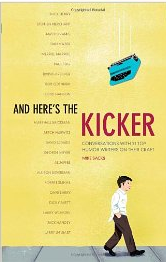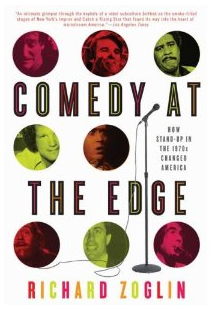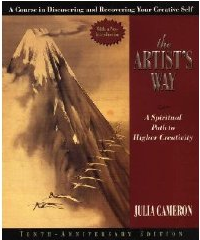 I recently finished a great comedy book, “And Here’s The Kicker: Conversations with 21 Top Humor Writers On Their Craft” by Mike Sacks. I got a ton of useful quotes from it, so this is part three in a rather long series of posts. I recommend buying the whole book, as there is a lot of insight inside. Since the book is interview style based, I’ve put the writer’s name above all of the quotes that are attributed to him.
I recently finished a great comedy book, “And Here’s The Kicker: Conversations with 21 Top Humor Writers On Their Craft” by Mike Sacks. I got a ton of useful quotes from it, so this is part three in a rather long series of posts. I recommend buying the whole book, as there is a lot of insight inside. Since the book is interview style based, I’ve put the writer’s name above all of the quotes that are attributed to him.
IRVING BRECHER
“I didn’t even think about it, really. I just thought they were funny. I didn’t know any better.” (109)
“The circus is funny on its own. And when you throw in more funny, it becomes too much. You need a solid framework.” (112)
Q: So the Marx Brothers films were shown to audiences and then tweaked in the editing room?
“No, not the films. The brothers would travel around the country performing the script live.” (113)
“I don’t believe that you can teach anybody to be a top comedy writer. If anything, you have to teach yourself.” (115)
“I would say that if you think you’re funny, then do it. As long as people genuinely respond to what you produce, keep at it. If their laughs seem genuine, keep writing. And don’t stop. Never stop.” (117)
BOB ODENKIRK
“We would ask ourselves about every sketch, “Is it funny? Really, truly funny? Or do we just think it’s funny because we really want it to be funny?” That doesn’t sound very scientific, but I think there’s an important truth there. We took this very seriously. It was very, very important to us. Second: What is this sketch about? That was a little challenging sometimes, because we’d have an idea that seemed funny, but the sketch didn’t really have anything to say.” (122)
“When writers would pitch ideas at meetings, I would talk at length about every idea. Because when you shit on a writer’s idea quickly, they either clam up or they pitch ideas just for the sake of pitching them and just to sort of waste time. They know everything is going to get shit on, and they’re more apt to pitch something that even they don’t believe in. so you get this list of shitty pitches that are being bandied about.” (125)
“My feeling was “Brian, you are a funny guy. You wrote this because you saw something funny here. What is it? What was funny to you? Because if we can all understand why you thought it was funny, then maybe we can make it great, or maybe we can all agree that it is not very good. But you didn’t intentionally just write a piece of shit.” (126)
“Then people get older, and they just don’t want to hear a new idea. They want to sit back and watch the same people do the same thing they did last week. That’s what TV exists for – it exists to be a mild sedative.” (129)
“Robert Smigel used to talk about finding the core joke of your sketch, which was something that struck me as a great lesson and one of the first things that a writer should think about when it comes to sketch comedy.” (132)
TODD HANSON
“How many people can say that something like that happened to them? That they and their friends have this little group in which they did this little fun thing together and then it ended up becoming internationally respected? Most people go through their entire lives without ever having anything like this happen. They get married, they have kids, they grow old, and they die. And nothing like this ever happens to them. But it happened to me. That’s amazing. What are the chances it’s going to happen twice? I’m going to go out on a limb and say probably zero. But don’t get me wrong. I still complain every day.” (137)
“I don’t think there is any point in making a joke that is not an honest joke.” (138)
“Everyone on the staff felt that it was just something to do where we would feel less like we were wasting our lives. Nobody ever had a goal of getting paid, let alone thinking we were going ot become media figures or have our work read all over the world. It was just something you did two nights a week when your shift ended.” (139)
“I don’t care if we are outside of the mainstream – I prefer it that way.” (140)
“People will often ask, “How do I get a job writing comedy?” And I just … it just annoys the fuck out of me. I always answer: “You do it for free for ten years and then, if you are really lucky, you get to write humor as a full-time job.” And they look at me like, “That’s not what I want to do.” (140)
Q: Any advice for those readers who dream of writing for The Onion?
“Start your own paper. Do your own thing. That’s what I would recommend to anybody who wants to do anything, not just write for The Onion. Do it for free and have fun. Whether it’s writing comedy or making music or painting or performing interpretive dance. If you want to do something creative, you should have a better reason for wanting to do it than to make money. If you want to make money, my advice is to sell shoes or go into banking.” (141)
“Comedy is extremely hard. It’s not just like, “this is so great!” It’s a hell of a grind.” (141)
“Mark Twain said, “The secret source of humor itself is not joy but sorrow.” He also said, “There is no humor in heaven.” (147)
BEN KARLIN
“Three things are needed to be successful in comedy, but I think it applies to almost everything. First, you need natural talent. Second, you need skill development. Third, you need ambition. Everyone’s ratio is different, but the most successful people have all of them.” (147)
MARSHALL BRICKMAN
“TV’s a monster. It just eats up material. It’s impossible to be continuously good. That’s why I’m amazed when I see a TV show that’s good consistently, night after night, week after week.” (151)
“I’ve always thought that television exists for the audience as a kind of parental entity. If it’s on TV, then it’s been certified by someone, somewhere. And if Johnny did a joke about Nixon or the mayor or whomever – then it became oaky to do jokes about that person.” (151)
“It’s easy to write for someone who’s already established a persona.” (152)
“It’s the hardest thing to develop a persona. That’s why movies and plays about fictional comedians are almost never truly convincing. Because it takes years for the audience to help a comedian shape a comedic persona.” (152)
“Developing a comic character requires a collaboration with the audience. It’s the only way you can do it. You have to get out there and do a variety of material. Over time, certain things, statistically, will continue to work, and other things will drop away, and the audience will tell you what seems correct for you – for what you project onstage as a personality.” (153)
“A lot of material was taken out because the audience just doesn’t care how clever the authors are. They only want a good story. And they’re right.” (155)
“After watching it, we thought, “Where’s the relationship?” When people come to me with ideas, sometimes they say, “I want to do a story about a war” or “I want to do a story about a hospital.” And I’ll always say, “Tell me the story in terms of a relationship.” (157)
“It’s a mistake to think that what you’re seeing up on the stage or on the screen is what the author intended. It isn’t. it’s always the result of a hundred compromises and accidents, both good and bad, and if you’re lucky, you get lucky.” (158)
“The great rule I learned from Woody is that when you get in a room with another person, you’re both responsible for the result – assuming that there’s a reasonably equal level of talent.” (159)
“Even though a great line or idea might be uttered by one person, it may have been triggered or stimulated by what the other party said.” (159)
“What I like to do is to turn ninety degrees from something that’s headed towards sentimental and undercut it.” (161)
MITCH HURWITZ
“I put in “call forwards,’ which were new for me. I inserted hints of events that hadn’t happened yet. And, of course, there’s no way you can get laughs out of that.” (170)
“I’m sure there are many great comic voices who really don’t quite understand what they’re doing – who are just true originals. But the rest of us tend to understand what already exists and then try to go further with it.” (173)
“In any creative endeavor, there needs to be progression. If there is no progression – no innovation – you’re finished.” (173)
“One of the key ingredients with humor is surprise.” (176)
“The system behind TV development is designed to fail. If you, as a producer, jump through all the hoops that the network asks you to jump through, the show probably won’t work. If you look at the success of the best shows, almost all are a result of someone breaking the rules.” (177)



